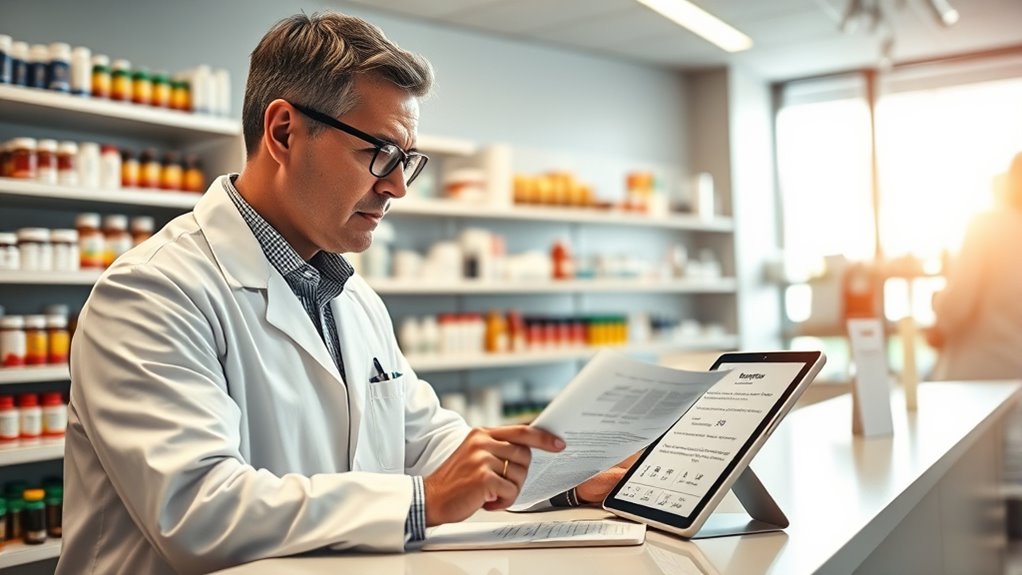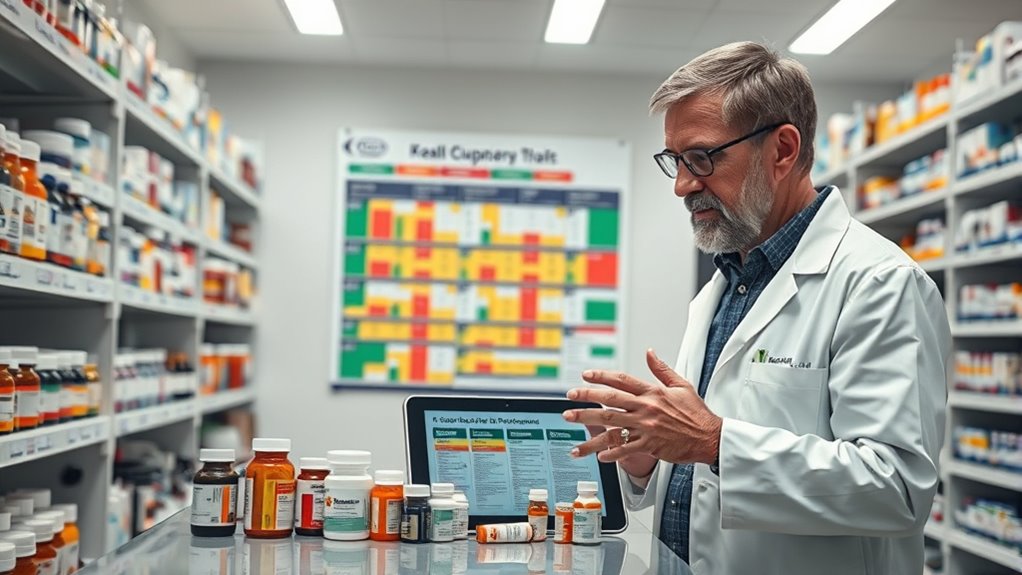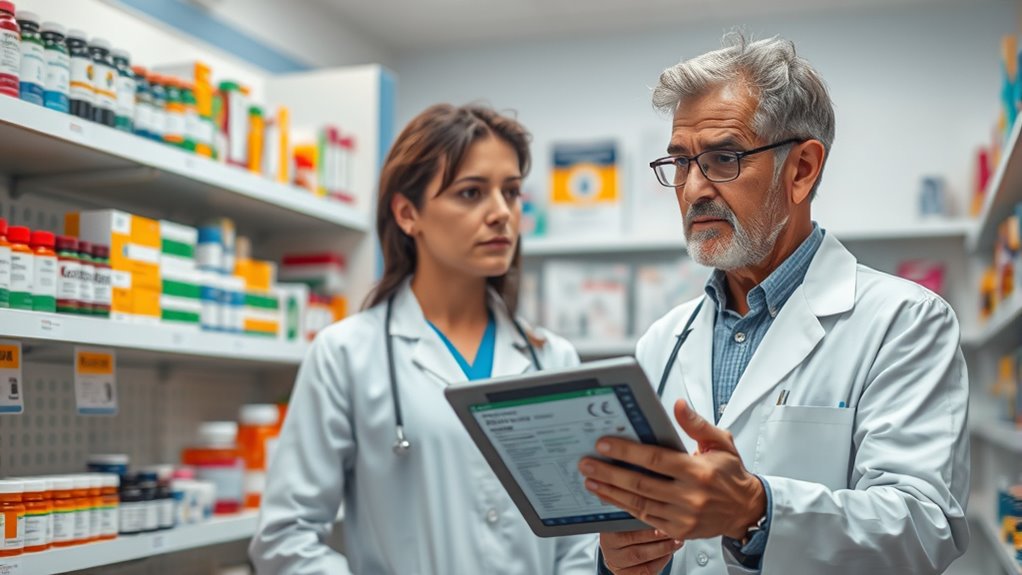When consulting your pharmacist, ask about your medication’s purpose and how it works, as well as potential side effects and signs to watch for. Make sure you understand the proper way to take it, including timing, food interactions, and any other drugs or supplements that might interfere. Also, clarify what to do if you overlook a dose, how long you’ll need to use it, and precautions or lifestyle changes to reflect. If adverse reactions occur, knowing the next steps is key — and there’s more to learn to stay safe.
Key Takeaways
- Inquire about the medication’s purpose, expected effects, and optimal duration of treatment.
- Ask about potential side effects, signs of adverse reactions, and when to seek medical help.
- Clarify proper dosing, timing, food interactions, and how to manage missed doses.
- Discuss possible drug interactions with other medications, supplements, and dietary habits.
- Seek advice on lifestyle modifications, precautions, and handling side effects or adverse reactions.
What Is the Purpose of This Medication and How Does It Work?

Have you ever wondered how your medication helps your body? Understanding the medication mechanism is key to knowing how it works. When you take a drug, it interacts with specific parts of your body to produce its effect, which is known as drug action. For example, some medications work by blocking certain signals, while others enhance natural processes. Your pharmacist can explain the purpose of your medication, whether it’s to reduce symptoms, treat an infection, or manage a chronic condition. Knowing how it works helps you understand why you need to take it as prescribed and what benefits you can expect. This knowledge empowers you to be more confident in your treatment and adhere to your medication routine effectively. Additionally, familiarizing yourself with industry trends can help you ask informed questions and better understand your treatment options.
Are There Any Potential Side Effects I Should Watch For?

While understanding how your medication works helps you see its benefits, it’s equally important to be aware of potential side effects. You should ask your pharmacist about common adverse reactions and signs to watch for, especially if you have medication allergies. Some side effects can be mild, like nausea or dizziness, but others may require immediate medical attention. Also, discuss herbal supplement considerations, as they can interact with your medication and increase the risk of side effects. Being proactive helps you recognize problems early and ensures your safety. Additionally, understanding the role of a pharmacist can help you feel more confident in managing your health. If you notice any unusual symptoms or reactions, contact your healthcare provider promptly. Knowing what to look out for empowers you to manage your health effectively and avoid complications.
How Should I Take This Medication for the Best Results?

To get the best results, you need to take your medication correctly. Make sure you follow the prescribed dosage and timing instructions carefully. Also, be aware of how food might affect how the medication works. Being informed about electric bike horsepower can help you understand the power and performance of different models.
Proper Timing Matters
Timing your medication correctly can substantially enhance its effectiveness. The timing importance often influences how well your treatment works and how manageable side effects are. Follow the recommended medication scheduling carefully—taking doses at consistent times helps maintain steady drug levels in your body. Skipping doses or varying the timing can reduce effectiveness or cause unwanted reactions. If your medication should be taken with food or on an empty stomach, sticking to that schedule is vital. Be aware of specific instructions about timing, such as taking a dose before or after certain activities or times of day. Proper timing ensures your body absorbs the medication ideally, maximizing benefits and minimizing risks. Always consult your pharmacist if you’re unsure about the best timing for your medication.
Follow Prescribed Dosage
Following your prescribed dosage precisely guarantees you get the full benefit of your medication. Take it at the recommended times and amounts, and never skip doses unless instructed by your healthcare provider. Proper medication storage is essential—keep your medicines in a cool, dry place away from children and pets. If you need a refill, understand your pharmacy’s refill policies and plan ahead to avoid gaps in treatment. Never adjust your dosage without consulting your pharmacist or doctor, as this can affect effectiveness and safety. Keep track of your medication schedule, and ask your pharmacist if you’re unsure about how to take your medication or if you experience side effects. Maintaining a consistent routine can help prevent remote work burnout and ensure adherence. Following these guidelines ensures you achieve the best results safely.
Consider Food Interactions
Did you know that food can impact how your medication works? Certain foods may interfere with medication absorption or effectiveness, so understanding food compatibility is essential. Always ask your pharmacist about whether you should take your medication with food or on an empty stomach. Meal planning can help you avoid interactions—some drugs require you to steer clear of dairy, grapefruit, or high-fat meals. Proper timing ensures you get the best results and minimize side effects. Keep in mind that even small dietary changes can affect your medication’s performance. If you’re unsure, consult your pharmacist for tailored advice. Being mindful of food interactions helps you optimize your treatment and stay safe while managing your health. Additionally, automation in business and other technological advances are transforming healthcare, making medication management more efficient and personalized.
Are There Any Interactions With Other Drugs, Foods, or Supplements I Should Be Aware Of?

It’s important to know if your medications might interact with other drugs, foods, or supplements. These interactions can affect how well your treatment works or cause unwanted side effects. Always check with your pharmacist to stay safe and get the most benefit from your medications. Monitoring your drug interactions can help prevent adverse effects and improve treatment outcomes.
Drug Interactions to Watch
Being aware of drug interactions is essential to guarantee your medications work safely and effectively. Herb interactions can alter how your drugs work, either increasing side effects or reducing their effectiveness. For example, some herbal supplements may interfere with blood thinners or antidepressants. Alcohol effects are another critical consideration; drinking alcohol while on certain medications can intensify side effects like drowsiness or cause liver damage. Always check with your pharmacist about potential herb interactions and alcohol effects. They can advise whether it’s safe to consume specific herbs or alcohol with your medications. Recognizing these interactions helps prevent adverse reactions and ensures you get the full benefit of your treatment. Don’t hesitate to ask your pharmacist about any concerns you have. Regular use of glycolic acid may also impact how your skin responds to certain medications or topical treatments, so be sure to discuss all skincare products with your healthcare provider.
Dietary and Supplement Risks
Understanding how dietary choices and supplements interact with your medications is essential for safety and effectiveness. Some supplements may interfere with drug absorption or metabolism, affecting how well your medicines work. For example, certain herbal supplements can reduce supplement safety by causing dangerous interactions with your prescriptions. Foods high in vitamin K, like spinach or kale, can counteract blood thinners, so knowing these interactions helps prevent complications. Additionally, being aware of halal dietary standards ensures that your food choices align with your health and ethical considerations. Always inform your healthcare provider about any supplements or significant dietary choices you make. This way, they can advise you on potential risks and adjustments needed to avoid adverse effects. Being aware of supplement safety and how your diet influences medication efficacy ensures you get the best results from your treatment plan.
What Should I Do if I Miss a Dose?

If you realize you’ve missed a dose, acting promptly can help prevent your medication from losing effectiveness. First, check your prescription instructions; some medications require you to take the missed dose as soon as you remember, while others advise skipping it if it’s close to your next dose. Avoid taking a double dose unless your healthcare provider tells you to. If you’re unsure what to do, refer to your emergency plan or contact your pharmacist for guidance. Having a clear plan for missed doses ensures you don’t accidentally overdose or reduce your medication’s effectiveness. Remember, timely action can make a significant difference in your treatment, so don’t hesitate to ask your pharmacist questions about how to handle missed doses safely. Understanding medication adherence can also help you stay on track with your treatment plan.
How Long Will I Need to Take This Medication?

After managing missed doses carefully, it’s also important to know how long you’ll need to continue taking your medication. Your healthcare provider will determine the medication duration based on your condition and treatment goals. Some treatments require only a short course, while others may be needed for months or even years. Understanding your treatment timeline helps you stay on track and achieve the best results. Ask your pharmacist or doctor about how long you should expect to take the medication, and whether you’ll need regular check-ins or assessments. Keep in mind, stopping medication too early can affect treatment effectiveness, while prolonged use may have side effects. Clarifying the treatment timeline guarantees you’re informed and confident in your medication plan. Additionally, being aware of treatment duration implications can help you plan your finances and health management more effectively.
Are There Any Lifestyle Changes or Precautions I Should Consider While Using This Medication?

When starting this medication, you may need to make certain lifestyle adjustments or take precautionary measures to guarantee its effectiveness and your safety. Some medications require lifestyle modifications, such as changing your diet, increasing physical activity, or avoiding alcohol. Others may have specific precautions, like avoiding certain foods, limiting sun exposure, or stopping smoking. It’s important to follow these guidelines closely to reduce side effects and improve the medication’s benefits. Your pharmacist might advise you to monitor your blood pressure, blood sugar, or other health indicators regularly. Always ask about any specific lifestyle changes or precautions tailored to your medication. Taking these steps helps you get the best results while minimizing risks.
What Should I Do if I Experience Any Adverse Reactions or Symptoms?

Experiencing adverse reactions or symptoms can be concerning, but knowing what steps to take helps guarantee your safety. If you notice any adverse reactions, contact your pharmacist or healthcare provider immediately. They can assess whether your symptoms are related to the medication and recommend appropriate action, such as adjusting the dose or switching medications. For mild symptoms, symptom management might include taking over-the-counter remedies or staying hydrated, but always consult your pharmacist first. Keep track of your symptoms, including when they started and their severity, to provide helpful information during your consultation. Never ignore serious signs like difficulty breathing, swelling, or severe rash—seek emergency care right away. Being proactive assures your safety and helps your healthcare team provide the best care possible.
Frequently Asked Questions
Can I Use This Medication if I Am Pregnant or Breastfeeding?
When wondering if you can use this medication during pregnancy or breastfeeding, it’s essential to evaluate pregnancy safety and breastfeeding considerations. You should ask your healthcare provider or pharmacist if it’s safe for your specific situation. They can provide personalized advice, considering any potential risks to your baby. Never assume a medication is safe without professional guidance, as some drugs may affect fetal development or pass into breast milk.
Are There Any Specific Storage Instructions for This Medication?
You should always ask about medication storage and handling guidelines to keep your medication effective and safe. Proper medication storage guarantees it stays at the right temperature, away from moisture, light, and children. Follow the handling instructions carefully, like whether to keep it refrigerated or at room temperature. Proper storage prevents contamination or degradation, helping you get the full benefit of your medication while avoiding potential risks.
How Long Before I See the Medication’S Effects?
It’s interesting how sometimes, the effect timeline for medication varies unexpectedly. You might wonder about medication onset and how long it takes to notice improvements. Typically, you’ll see effects within a few days to weeks, depending on the medication and condition. Factors like dosage and your body’s response play roles. If you’re unsure or don’t see results, check with your pharmacist to confirm you’re on the right track and understand the expected effect timeline.
Is This Medication Safe for Children or Elderly Patients?
When asking if a medication is safe for children or elderly patients, you address age-related concerns directly with your pharmacist. They can tell you if dosage adjustments are needed or if there are specific risks for certain age groups. Always share your loved one’s age and health conditions, so the pharmacist can provide personalized advice and guarantee safe use, preventing potential adverse effects or interactions.
What Should I Do if I Accidentally Take More Than the Prescribed Dose?
Think of your medication as a delicate dance; too much, and you risk losing balance. If you accidentally take more than prescribed, act swiftly. Stop taking the medication and seek immediate overdose management. Contact your emergency contact or poison control right away. Don’t wait—timing is vital. Your quick action can prevent serious harm. Always follow your healthcare provider’s instructions and keep emergency contacts handy for peace of mind.
Conclusion
So, now that you know the key questions to ask, are you prepared to take control of your health? Remember, your pharmacist’s advice can make all the difference, but what if they mention something unexpected? Stay vigilant, stay informed, and don’t hesitate to ask more questions. Your next step could be the key to better health—are you ready to discover what’s truly behind your medication? The answers might surprise you.









